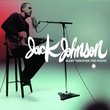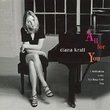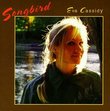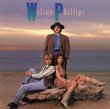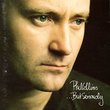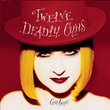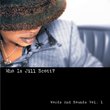| All Artists: John Williams Title: Catch Me If You Can Members Wishing: 0 Total Copies: 0 Label: Dreamworks Original Release Date: 12/25/2002 Re-Release Date: 12/10/2002 Album Type: Soundtrack Genres: Jazz, Special Interest, Pop, Soundtracks, Broadway & Vocalists Styles: Comedy & Spoken Word, Holiday & Wedding, Oldies, Vocal Pop, Traditional Vocal Pop Number of Discs: 1 SwapaCD Credits: 1 UPCs: 600445041028, 0600445041028 |
Search - John Williams :: Catch Me If You Can
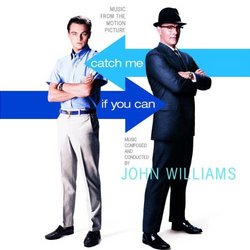 | John Williams Catch Me If You Can Genres: Jazz, Special Interest, Pop, Soundtracks, Broadway & Vocalists
Steven Spielberg veered from the futuristic sci-fi flirtations of A.I. and Minority Report with this brisk, stylish period take on the career of teen con-man extraordinaire Frank Abagnale (Leonardo DiCaprio) and his dogged... more » |
Larger Image |
CD DetailsSynopsis
Amazon.com Steven Spielberg veered from the futuristic sci-fi flirtations of A.I. and Minority Report with this brisk, stylish period take on the career of teen con-man extraordinaire Frank Abagnale (Leonardo DiCaprio) and his dogged G-man pursuer/de facto extended family member Carl Hanratty (Tom Hanks). As always, the director's musical collaborator is John Williams, and the scoring legend uses the occasion of their 20th collaboration as a rewarding musical journey back to the days when he was known as Johnny Williams, ambitious young pianist for Henry Mancini on such early jazz scores as Peter Gunn. Informed by a half-century of subsequent achievement, Williams's return to the jazz idiom of his youth yields a smart, nervous score that evokes more than mere nostalgia. But with Dan Higgins's moody sax often leading the way, the veteran composer's work here seems more evocative reinvention than revisitation, yet another tribute to his uncanny ability to make any idiom his own. A handful of pop standards (including Sinatra's "Come Fly with Me," Getz and Gilberto's "Girl from Ipanema," "The Christmas Song" by Nat "King" Cole) deftly color both period and plot, but, as always, it's Williams who provides Spielberg's masterful imagery with its musical life's blood. --Jerry McCulley Similarly Requested CDs
|
CD ReviewsGreat Score Peter Kline | Coral Springs, FL United States | 12/15/2002 (5 out of 5 stars) "John Williams goes back to his roots. In the early 50s he issued a bunch of albums conducting a big band. Yes, he arranged them and played piano. This jazzy and fun score reminds one of the best of Henry Mancini. Add standards by Nat Cole, Frank Sinatra and Judy Garland among others and this CD perfectly catches the feeling of the time period that the film takes place in. Williams' best score in a long time." John Williams and his ever changing music Pamela K Scott | Columbia, SC United States | 12/30/2002 (5 out of 5 stars) "This score, like most of John William's music, is strickingly different than the ones before. William's ability to dabble in different musical forms is decidedly one of his greatest strengths, along with his ability to follow the pace of the movie. If you happen to simply be a fan of William's, I think you'll enjoy this bit. It's very light, entertaining, and enjoyable. A very happy bit, indeed. Don't expect it to be like Star Wars, but expect to enjoy it." A different side of John Williams E. Banson | San Francisco Bay Area, CA United States | 12/13/2002 (4 out of 5 stars) "If you listen to many of John Williams' memorable themes and scores, it's amazing to know that the guy started out as a jazz musician. With his score for "Catch Me If You Can," he gets a chance to bring out that side of him with this slick, jazzy and infectious score. One drawback is it does lacks the true William's signature: The memorable melody. It's likely due to the fact that Williams and Spielberg have a film set in an era (or begins in an era) that was musically into jazz styles like Cool and Be-Bop; styles that were driven more on dissonance and broken melodies created by improvised riffs. It only seems fitting to incorporate those styles to accompany the film. Nevertheless, the arrangements and orchestrations are top-notch. Even Spielberg points out on the liner notes that we "may swear that the E flat sax solo was improvised, but John wrote every single note of it." With that, this score is riddled with the sound of a saxophone. There might even be credit to what Spielberg wrote: the saxophone solos do sound improvised. It seems Williams uses the saxophone in the score to parallel the main character Frank Abagnale (Leonardo DiCaprio)who is an amazing imposter. Because like an imposter, his every move may sound and appear improvised, but underneath the veneer, every move (or every note) is calculated. There are three themes in this score. The main theme here is aptly titled Catch Me If You Can, a minimalist piece that consist of vibes, xlyophones and woodwinds written in an offbeat time signature. The second is an upbeat 4/4 progressive motif with staccato strings and alto saxophone riffs that reminds me of William's own "Home Alone" scores and Howard Shore's "Mrs. Doubtfire" score. This theme is present in "The Float" and "Doctor, Lawyer, Lutheran." The third is a five minute concert piece entitled "Recollections (The Father's Theme) which showcases the saxophone and xlyophone again. A slow, haunting piece. It harkens Gabriel Yared's work for "The Talented Mr. Ripley," which is another film about an imposter.The songs are great in this CD and it's amazing how they somehow interweave with the score which is a plus. Overall, the score stands out from previous Williams work because it's his most daring and youthful score in my opinion, sounding like nothing he's written before. Unfortunately though, a few moments in the score sound like other composers which is another reason why I gave it four out of five stars. Thankfully, it's only in a few moments in the score. "Catch Me If You Can" proves that John Williams is a versatile film composer who still delivers the goods."
|

 Track Listings (16) - Disc #1
Track Listings (16) - Disc #1